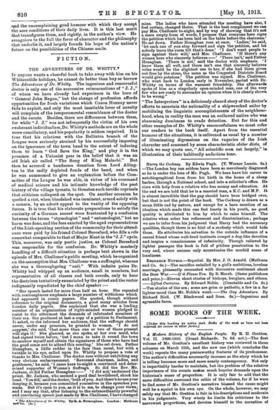SOME BOOKS OF THE WEEK.
[Under this heading we notice such Books of the week as have not been reserved for renew in other forms.] A Modern History of the English People. By R. H. Gretton. Vol. II. 1899-1910. (Grant Richards. 7s. 6d. net.)—The first volume of Mr. Gretton's excellent history was reviewed in these columns on March 15th, and the new one (which concludes the work) repeats the many praiseworthy features of its predecessor. The author's difficulties necessarily increase as the story which he is telling becomes more and more nearly contemporary. Not only is impartiality harder to maintain, but the problem of the relative importance of the events makes much heavier demands upon the historian's sense of proportion. It is only fair to add that the same difficulties surround the critic of the volume, for if he were to find some of Mr. Gretton's narrative biassed the cause might well be a squint in his own eye. On the whole, however, we may safely say that Mr. Gretton is fair in his descriptions and moderate in his judgments. Very wisely he limits his criticisms to the narrowest proportions, and devotes himself to the narration of
events. In the period covered by this volume the events them- selves would be of sufficient interest to make its pages thrilling, even without the additional merit of Mr. Gretton's gift of story- telling. The Boer War and the Fiscal Controversy take up most of the first half of the book, while its last pages are occupied by the Constitutional crisis which cannot yet be considered at an end. As in the first volume, however, Mr. Gretton is not exclu- sively concerned with high politics. He lays great emphasis upon his descriptions of the social side of life, and their success is undeniable. The last sentence of the book, in which he sums up this aspect of the last reign, will serve as an instance of his penetration : "King Edward, genial, experienced, but never disillusioned, may well stand at the head of a period of English life enfranchised from strict upbringing, making mistakes, spend- ing rather wildly, inclined to be noisy, but on the whole demanding reality, and seeking more delicate estimations of character than were to be achieved by hard-and-fast rules." A good index gives additional value to the work for purposes of reference.











































 Previous page
Previous page